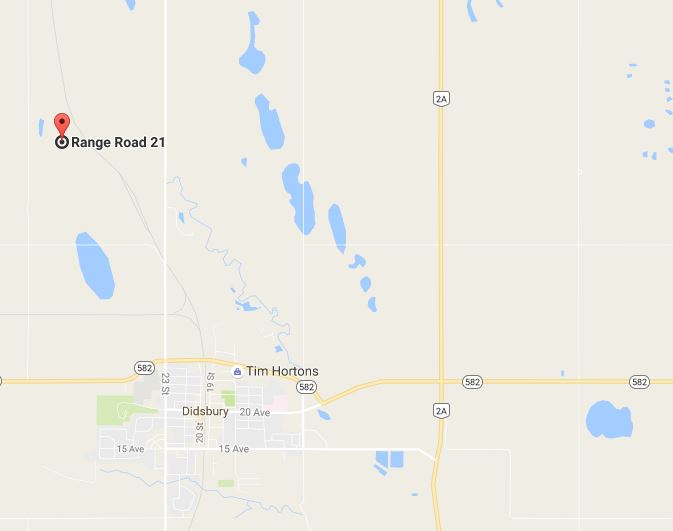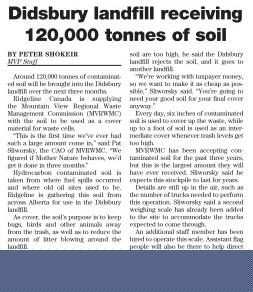Councillor raises road concerns over heavy truck usage by Craig Lindsay, September 21, 2016, Didsbury Review
As hundreds of thousands of tonnes of contaminated [oilfield waste] soil is being trucked into the Didsbury landfill, at least one Town of Didsbury councillor is questioning whether it will damage a town road and who should pay for it. [Ordinary Albertans plan the AER, Alberta NDP government and oil and gas industry?]
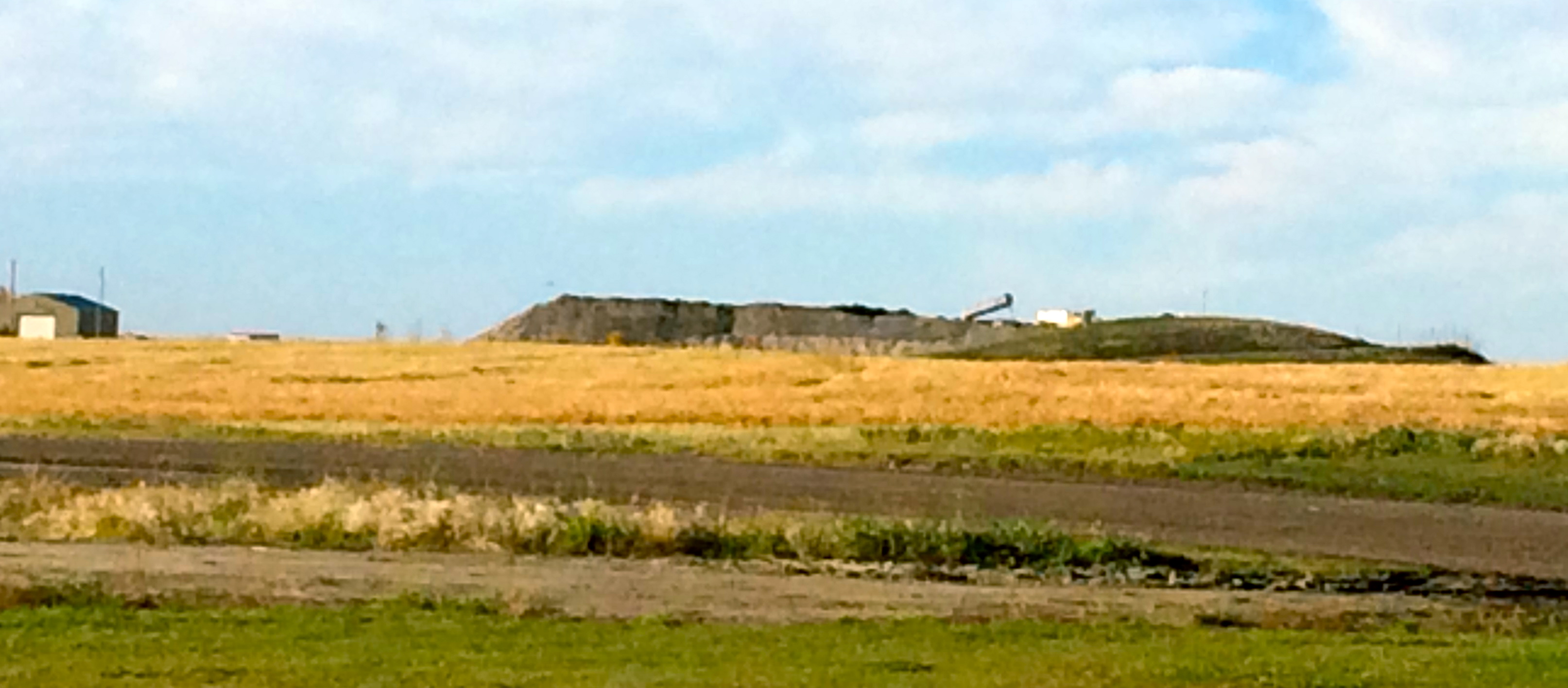
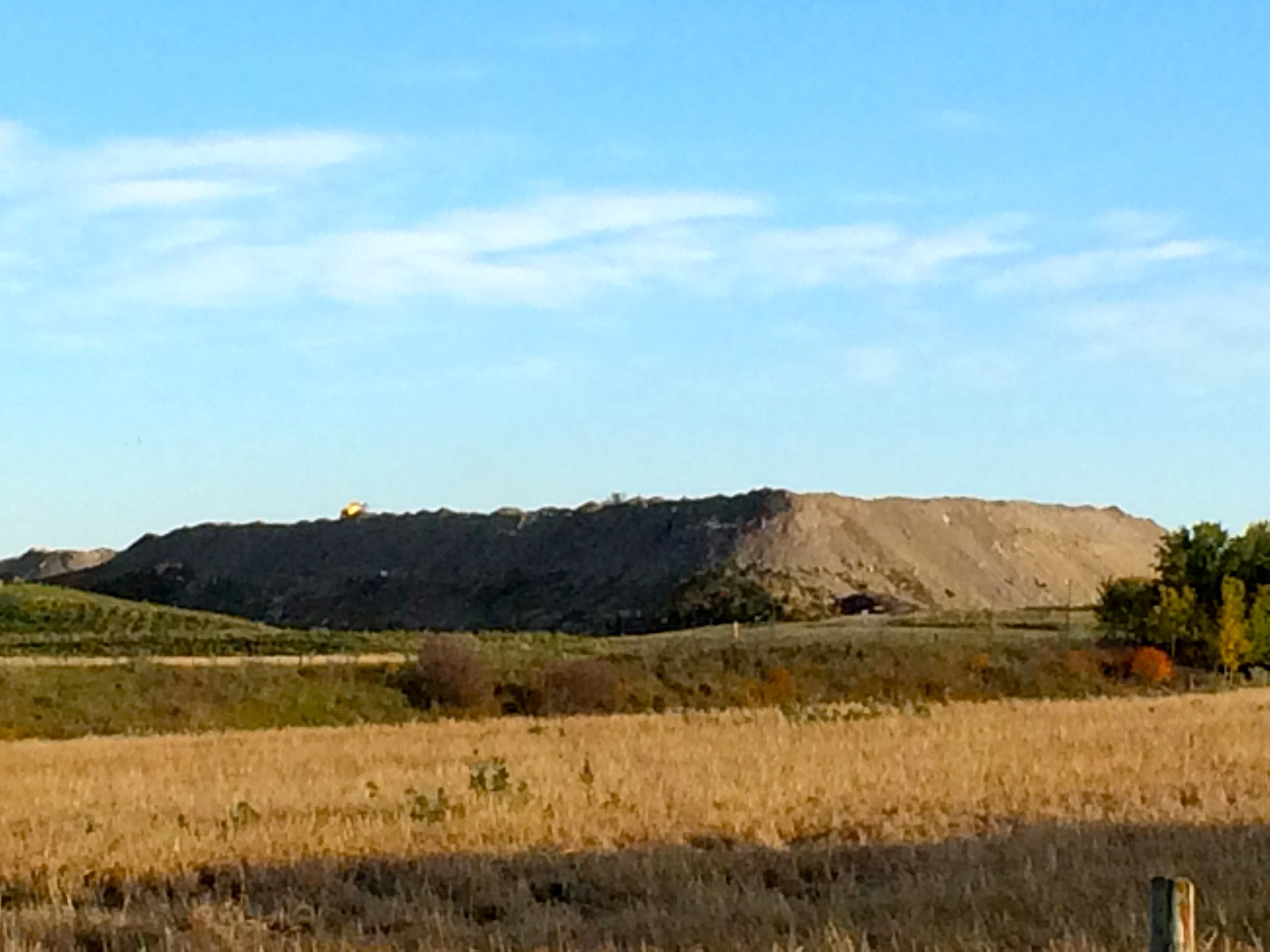
2016 09 27: Photos by Diana Daunheimer of the contaminated oilfield waste pile at Didsbury landfill
Hold your breath if you live in Didsbury on windy days, which is often in Alberta.
Location of the contaminated oilfield waste dump north of Didsbury, Alberta
Coun. Joyce McCoy gave a notice of motion last Tuesday, which was carried by council, to direct administration to bring back information [What good will that do? Buy the polluters more years of abusing the community? Lead to council directing administration to bring back more information in 2017, more in 2018, more in 2019, more in 2020, while the community’s roads disintegrate?] regarding the effect on 23rd Street west to the landfill from trucks bringing in 120,000 tonnes of hydrocarbon contaminated soil and to ensure that Didsbury’s interests are maintained.
How much more road damage evidence is needed?
Aren’t the roads already damaged too much? Or did the county wait for the significant damages to occur first, to use the damaged roads as “baseline?”
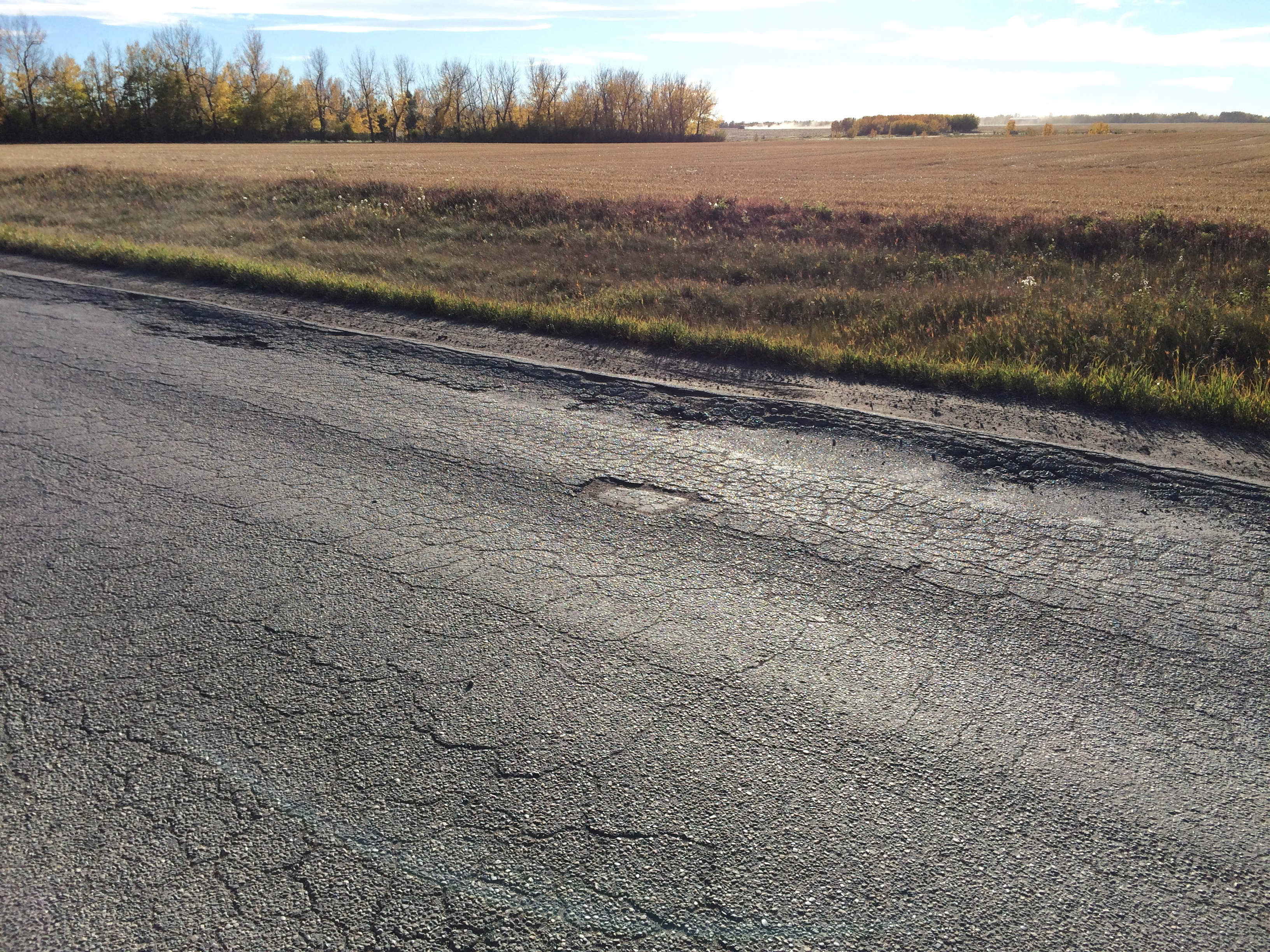
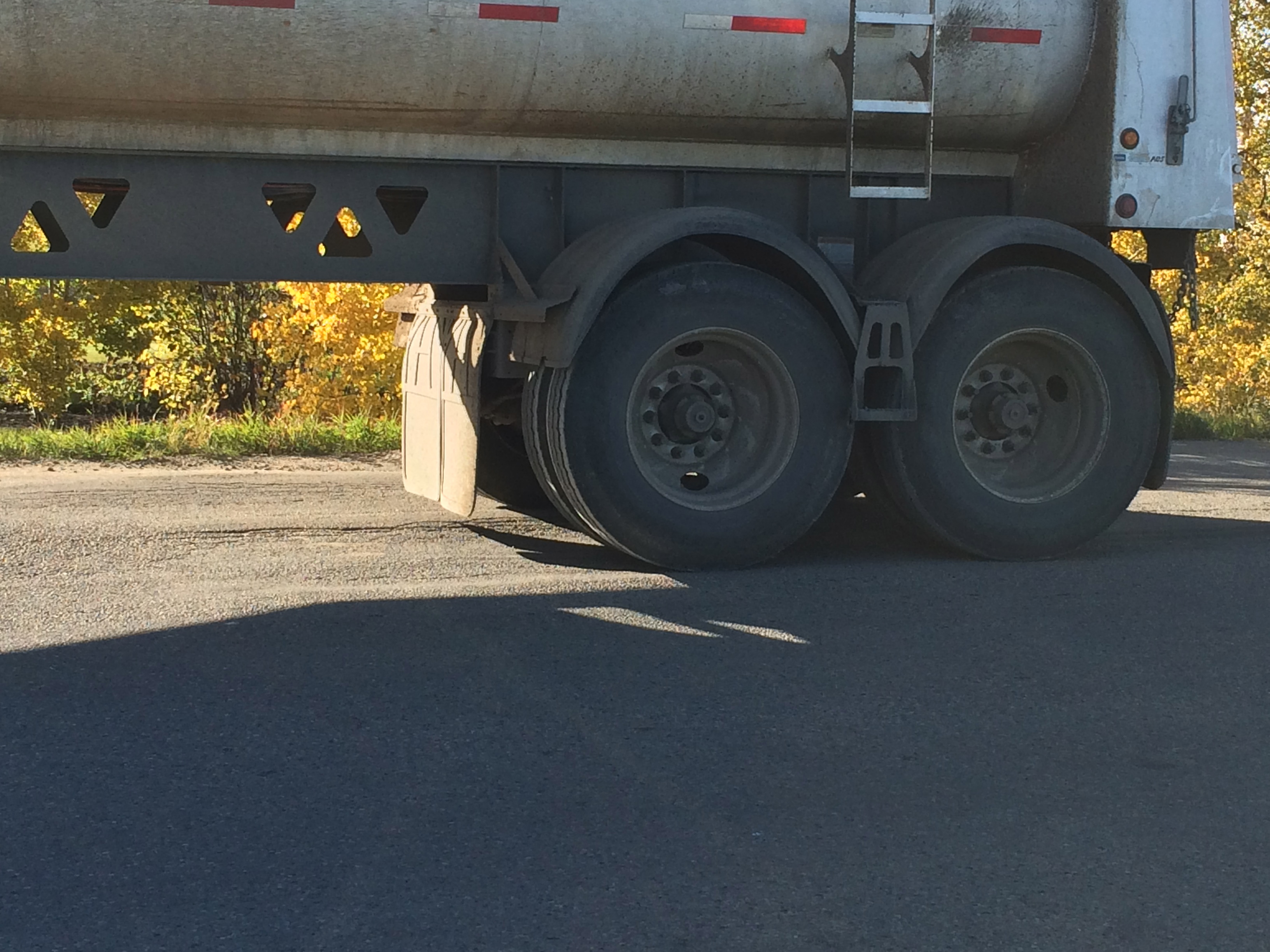
2016 09 27: Photos of the damaged road in question and oilfield waste hauling truck by Didsbury area farmer and mother, Diana Daunheimer
The soil is being brought in by the Mountain View Regional Waste Management Commission (MVRWMC) from Ridgeline Canada to be used as cover material for the landfill. Large trucks bring the soil to the landfill and the transportation route goes down 23rd Street, which is owned by the Town of Didsbury, and onto Rge. Rd. 20.
McCoy is concerned that the amount of heavy traffic will be detrimental to the roadway and asked administration to look into possible solutions.
“Basically, 120,000 tonnes or however much it ends up being will destroy that piece of road from 582 to the train tracks, which is a town road,” said McCoy. “My thoughts are the town should consider putting a permanent partial road ban on RR20, to facilitate permits that would generate revenue to rebuild the road when Ridgeline is done.” [Really? Oil and gas industry pay for damages they cause in Alberta while they profit-take? What galaxy is Mountain View County pretending to be in?]
She added that with an 85 per cent road ban in place, Ridgeline wouldn’t be able to drive the road until they have a permit, which would include a charge per tonne.
“The monies raised from the permits would go into a reserve for the rebuilding of the road,” she said.
McCoy would also like to see assurances that the contaminated soil is properly covered and not blowing around when it is being transported on the Didsbury portion of the road. “It was suggested that there should also be an agreement that (Ridgeline) will be responsible for any debris left on the road or in ditches by their truck,” she said. [Isn’t too late to be asking for assurances and public health protection after truck loads of contaminated oilfield waste have already been transported through the community, dumped and the roads already damaged?]
Coun. Sheila Schulz sits on the Mountain View waste commission as the Town of Didsbury’s representative and said that McCoy made some interesting points regarding the contaminated soil.
“Joyce brought up some great questions that hadn’t occurred to me,” said Schulz. “Some of the questions she asked I had the answers to and I was comfortable with. I didn’t think there were serious concerns when it was presented to me by Ridgeline and by our (MVRWMC) CAO (Pat Sliworsky). In my opinion, Pat Sliworsky knows what he is doing with landfill.”
Sliworsky told the Review that MVRWMC gets paid to take the hydrocarbon contaminated waste and uses it for “daily or intermediate cover.”
“They (Ridgeline) started towards the end of last month and plan on hauling the next two to three months depending on what Mother Nature decides,” said Sliworsky.
MVRWMC has been accepting hydrocarbon contaminated soil for the past three years but this is the largest amount they have ever received.
Sliworsky said that the hydrocarbon contaminated soil is acceptable at the Didsbury landfill because the landfill is a class 2B site.
“We are able to use this type of material if it matches the requirements (government regulations) to be used for daily or intermediate cover, and that’s the type of material we’re getting in,” he said.
Sliworsky said he had talked to town administration and was told they weren’t interested in a road use agreement.
“I did my due diligence by contacting them and letting them know what was coming in,” he said, adding that the administration had no issues with the road use. “I asked them if there was any road use agreement we needed to take care of and was told that at that time from their administration office, no, there wasn’t.” [How many elected officials in Alberta have the required integrity, ethics and courage to stand up to the oil and gas industry putting public health at risk and damaging rate payer paid for and maintained public roads and communities? Emphasis added]
[Refer also to:
2016 08 30: Didsbury landfill receiving 120,000 tonnes of contaminated oilfield waste
August 30, 2016 Mountain View Gazette
2013 01 15: Money, politics and pollution in fracking country and waste dumping
2012 12 25: Mountain View County investigating possible road bans to prevent oilfield traffic damage [Is it working?]
2012 07 19: Illegal waste dumping needs to stop
2011 & 2012 Encana unconventional drilling waste dumping in the same field of foodland at Rosebud

2012: Encana waste dumping on foodlands at Rosebud

